- Home
- William Kowalski
The Good Neighbor Page 23
The Good Neighbor Read online
Page 23
“Well then,” he hissed into the receiver, “why don’t you write a poem about it?”
He wished he hadn’t said that, because then she started to cry, and it was like a punch in his gut. Once he had loved her for the way she saw the world in broad strokes of emotion, and admired the way she’d tried so hard to capture it in words—and always failed. Had he ever told her that? Probably not. Maybe he should tell her now.
“Our marriage is over, Coltrane,” she said, weeping. Too late.
At that moment, he had a flash of how the whole business must look to her. And he thought: she must think all I care about is money, that money is the most important thing. Well, it’s not. Not forever, anyway. But right now it is. Because you have to make sure you have enough. It’s fine and dandy to sit around writ ing poems or taking vacations or whatever. But before you did anything else, you had to make sure you had enough. And we do not have enough, not yet. Not even close. And I, it seems, am the only one who understands that.
“I agree,” said Colt.
236 WILLIAM KOWALSKI
When she didn’t say anything for a long moment, he hung up. “Everything okay, Coltie?” asked Buddha. “Everything hunky
dory?”
Colt looked at the television screen; the market had shot up al ready by twenty points. He should have been in on the action from the first second. Now he would be playing catch-up all day.
“It’s all good,” said Colt.
He pulled his chair in closer to his desk and focused hard on the television, trying not to blink.
“It’s all good,” he said again, though now they really were ig noring him.
❚ ❚ ❚
The phone rang again about four minutes later. It was Wayne Steinbach.
“Uh, we got a situation here,” he said.
“I can’t wait to hear it,” Colt said. It was 9:46 A.M., and he was already weary. More than anything, he wanted to go home and get back on the couch.
“Randy Flebberman is down here and he’s madder ’n a bull at a ball fry.”
“A bull at a what?”
“You know, when they castrate the bulls and fry up their balls?”
“I was not aware of that charming custom,” said Colt. “Is that before or after you marry your sisters?”
“What?”
“Nothing. Tell me what Flebberman is doing.”
“Well, he says he’s gettin’ a lawyer and an injunction and all that stuff.”
“He doesn’t have an injunction yet, does he?”
“Well . . . I dunno. He’s sayin’ he’s gettin’ one, is what I’m tellin’ ya.”
The Good Neighbor
237
Colt sighed. Now the stocks he’d targeted had completely lost their attractiveness, and his wife was leaving him. And now this. It was not going to be a bad day; it was going to be a terrible day. He pounded his fist on his desk. Everyone’s computers shook. Joe, Raoul, and Buddha looked at him again, this time in alarm.
“Tell me this one thing. Is he waving a piece of paper around in the air?” he asked Steinbach.
“No.”
“Then he doesn’t have an injunction.” “How d’you know?”
“Because the first thing people do with injunctions is wave them around in the air. Look, Steinbach, this is a waste of time. I own that land and I don’t have to have dead people on it if I don’t want to. Understand? I hired you to do a job, you said you would do it. That’s a verbal contract. Verbal contracts are binding, just like paper ones. Ask any lawyer. I can take your ass to court.”
“Now look. Randy Flebberman is a friend of mine,” said Stein bach, his voice growing higher. “I went to high school with him. Hell, I dated his wife once. Before she was his wife, I mean. I knew he wasn’t gonna like it, but if I’d a known he was gonna take it like this, I wouldn’t a done it at all!”
“Are you ready to go to court with me, Mr. Steinbach?”
There was a long moment of silence; Colt hoped Steinbach wouldn’t know that he wasn’t in the least legally bound to com plete the job, as long as he hadn’t accepted any money yet. He waited.
“No,” Steinbach said finally.
“Right. Then I’ve said all I have to say. Good day to you, sir.” Colt hung up and met the stares of his coworkers.
“Dead bodies?” said Raoul. “On your property?” said Joe.
“What’s goin’ on, Colt?” asked Buddha. “Your wife finally find out where you been buryin’ your enemies?”
“Would you guys mind your fucking business?” Colt said,
238 WILLIAM KOWALSKI
louder than he’d meant to. Then, having attracted the attention of everyone in the office, he decided a break was in order. He got up and put his coat on.
“Where you goin’?” asked Joe. “It’s not even ten o’clock!”
“My morning is shot,” said Colt. “Fucking wife, fucking Stein bach, fucking you guys. I need a break. I’ll see ya later.” And he left, with the eyes of the entire office on him—for a split second, before they were drawn back to their screens.
❚ ❚ ❚
Twenty minutes later, Colt was wandering slowly through Cen tral Park, his hands deep in his pockets and his collar up around his ears, although it was actually getting warmer out—it looked like the snow they’d already had might have jumped the gun on win ter. They could be in for another week or so of fall weather before things got really shitty again. That would be good, he thought. He hadn’t been ready to winter in, not yet.
By force of ancient habit, he headed up to the Swan Pond. When he was a boy, he had loved to come up here and watch the big white birds glide along the top of the water, admiring their aristocratic elegance. It was one of the few memories of his child hood that was pleasant. If he had any money, which he usually didn’t, he used to buy a handful of food from the vending machine and toss it in the water, little by little, drawing it out so he could stay a long time. The ducks would come in, too, vying for a chunk of the action, but the swans always chased them off. Colt remem bered now how that made him feel: proud. Because they were eat ing his food. He admired swans for not being afraid to take what they wanted—shame never entered the picture for them. Just like him. There was no shame in doing whatever you had to do to sur vive, even if it meant crawling on your belly through shit and mud all the early years of your life. That was nothing to be ashamed of—as long as you were crawling uphill.
The Good Neighbor
239
It had been a long time since he’d come here. Both the ducks and the swans were gone now, driven south by the early storm. All that was left were pigeons. Colt had always hated pigeons. Disappointed, he started wandering back down toward the south gates of the park, where he’d come in.
So Francie wanted a divorce. As he’d told her, that was not un expected. It wasn’t the first time he’d thought of it himself, either. Several times, in fact. Why hadn’t he gone ahead with it? Because there seemed to be hardly any point—he was too busy to justify it. For all the hours he’d spent working every week, they might as well have been separated, anyway. Funnily enough, they only saw each other about as often as a recently divorced couple might—a divorced couple on slightly better than amicable terms, that is, who had perhaps agreed to continue sleeping together every once in a while just to take the edge off the loneliness.
The real truth was—and this was something he would have been ashamed to admit, even to Forszak—he was simply more in terested in making money than anything else. Well, that in itself was not so unusual, in this business. But he cared about it more than sex, even, and that was unusual, and that was the part he was ashamed to admit. A lot of the guys in the office ran around on their wives. By no means all, but some. It almost seemed to go hand in hand with the kind of work they did. Yet Colt had never done it—not for lack of opportunity, and not out of virtue, either. He had simply always been puzzled by what the point of all that fooling around was. Soon enough, everything new
became old; all acquisitions eventually became another liability. Then you ended up like this Joe, who had left his first wife to move on to the sec ond, and then on to a third; it was probably only a matter of time before Number Three found out he was shtupping a woman in Commodities. And all he had to show for it was two alimony suits and an ulcer. Jesus, what a clusterfuck!
For Colt, things were different—precisely because it was all the same. Money and women, that is. They meant the same thing to
240 WILLIAM KOWALSKI
him, but money was more easily handled, more easily controlled. And really more exciting, too. Something he never admitted to anyone, not even Francie, was that sometimes, sitting at his desk, surrounded by all the chaos and excitement and fear, he got a hard-on. The whole mess was so turbulent that he would grow wood right there in front of everyone, hidden only by the three- quarters of an inch of whatever the hell fake stuff his desk was made of. When he scored hard on a stock, it got harder. And then he would go into the bathroom and whack off. Sometimes it hap pened twice a day, so that by the time he got home he had noth ing left to give, anyway.
And Francie—it seemed like the longer she was on the meds, the less she came on to him. She was content to sit in her chair in the corner of the apartment and read her goddam Emily Dickin son. He would stagger in around six or seven or eight o’clock, eyes bleary, groin drained, eat dinner and go to bed. And that was their marriage: a whacker and a poet; a wealthy man, his lonely woman.
In some Arab cultures, Colt knew, all the man had to do was walk around his wife in a circle three times and say, “I divorce thee, I divorce thee, I divorce thee.” Something like that around here would be an innovation, he thought. Now I have to deal with lawyers.
And I hate the fucking lawyers.
❚ ❚ ❚
Colt bought a bag of peanuts from an intrepid vendor who hadn’t yet packed it in for the season. He ate a few and amused himself for another twenty minutes by throwing the rest of them at the pigeons. Then he went back to the office. When lunchtime came, he didn’t go with the other guys. Even after four o’clock, he stayed on, trying once again to penetrate the murkiness of the
The Good Neighbor
241
Eastern market. No after-work drink invite from Forszak this time. He was the only one left.
What gods control you? he asked the silent screen, as it scrolled its endless litany of numbers before him. What’s the key to un locking your secrets? What mountain do I have to climb to find it?
But the screen, as always, told him little beyond the facts.
And I need the facts behind the facts, Colt thought. I have the answers, all of them. Problem is, I don’t know what the questions are.
But some questions were beyond the range of mortals, even the great Coltrane Hart. At nine o’clock he went back to his favorite bar, where he had some more Scotches and another cigar. A few women talked to him, but he was merely polite, and did not en courage them to come home with him, though he knew he could have without much effort. And it occurred to him for the first time in years, looking around at these strange and hungry females who were attracted by his clothes, his scent of money, his expres sion of power and control, that none of them was nearly as beau tiful as Francie, and certainly not half as smart.
And he thought: I think it’s a pretty safe to say that I have roy ally screwed up.
21
Disinterment
The snow wasn’t going to stay after all. They had been re prieved by the sun and warming wind, though Francie knew these
had only delayed their sentence rather than commuted it. It was good enough for the living, though it meant nothing for those who had been yanked from their beds and been spirited away. Like the poor Musgroves.
To Francie, it felt like the secret police had come—as if, some how, it was against the law in Colt’s world to be dead. She stood in the yard and looked at the mess that the backhoe had made of the earth. And my husband is their secret chief, she thought—he’s the invisible man in the invisible office, handing out the orders that make people disappear.
Even the giant old stump that had protected Marly’s stone was a casualty, lying slanted half in and half out of the hole, its roots exposed—like a molar torn from an old man’s mouth. The excava tors had opened the graves into one large, common pit, and the bottom of the hole, which for so many years had been the resting place of the sleeping six, was now a mess of chewed-up yellow
244 WILLIAM KOWALSKI
and-brown mud. Meltwater trickled down the sides of the pit, pooling there into an unhealthy quagmire.
❚ ❚ ❚
The disinterment of the Musgrove family remains had been one of the worst things Francie had ever had to watch. She almost couldn’t watch it; she would have preferred to stay in the house, hiding her head under a pillow, like an ostrich. But when Flebber man arrived, beside himself with rage and grief, she knew she couldn’t just pretend it wasn’t happening.
Steinbach’s trio of men first plucked the stones out of the earth, putting them in the back of a dump truck. They tossed them ca sually, as if they were nothing more than rocks, and they clattered and broke in the truck bed.
“Goddamn it!” Flebberman had howled at them. “Wayne, you tell them yahoos to watch what they’re doin’!”
Steinbach, who could barely meet Flebberman’s eyes, had a word with his men. For a moment, Francie thought everything was going to be all right—suddenly all was understood, and so they could just go home, couldn’t they? But then the backhoe ripped into the soil, chewing a large swathe above where Francie imagined the Musgroves’ middles would be.
Flebberman lost what little self-control he still possessed. “Steinbach!” he screamed, over the backhoe’s roar. “I thought
you and me was friends!”
Steinbach pretended he couldn’t hear him.
“How can you do this?” Flebberman screeched. “Stop it! Please, Steinbach! Stop it right now!”
Francie felt her heart was breaking. Steinbach looked up at him finally, hangdog, and shook his head.
“Can’t!” he said.
“Why not?!”
The Good Neighbor
245
“Contract. He offered me twice the usual rate, Randy. I had to take it.”
“Yeah, right,” said Flebberman. “And all them little Steinbachs gotta have new shoes. Izzenat right?”
Steinbach didn’t answer.
“Well, I just hope no one ever digs up yer family’s bones!” he spat, screaming over the engine’s noise. “Or yer gonna know just how I feel right now!”
Flebberman turned to Francie, who had been dreading this mo ment. She was the wife of the man who had ordered this desecrtion, after all. She was Elena Ceau¸sescu, Imelda Marcos. She cringed, and waited for what he was going to say to her.
But he didn’t scream. Instead he came and put his face close to her ear, so that she could feel his breath. Involuntarily she closed her eyes, waiting to see what he would do. She would not have been at all surprised had he sunk his snuff-yellowed teeth into the firm flesh of her neck.
But he didn’t. Instead he spoke.
“Where is he?” he asked, so quietly she barely heard him.
She hadn’t expected that. It all seemed so obvious then—the reasons people sought revenge. They didn’t just do it for no rea son, for petty slights. They were driven by something greater than themselves; they were made mad with outrage. She understood now. And, though she knew that whatever was going to happen was probably not a good idea, she also knew it was one thing she could turn her back on—for reasons of her own. As long as it didn’t go too far.
It never occurred to her not to tell him. Whatever he did to him, Colt had it coming.
“New York,” Francie said. “Where?”
Francie shook her head. He was even closer to her now—she could smell tobacco on his breath, and sweat and engine oil on his
246 WIL
LIAM KOWALSKI
body. His arm brushed ever so lightly against her right breast, and she felt it all the way to her toes.
“I shouldn’t tell you,” she said, knowing she was only seconds away from doing so.
Flebberman nodded, understanding.
“I still have yer check,” he said. “Is that address still good?”
Of course—the check she’d written for the truck. Francie said nothing. She nodded, the movements of her head barely percepti ble. Then she closed her eyes again.
When she opened them several moments later, Flebberman was handing one of Steinbach’s men something. Then he got into his truck. Francie saw that the something was a roll of money. The workman turned to his fellows and grinned; they gathered around him, and he divvied it up, a small handful to each. Steinbach him self hadn’t noticed this, because Flebberman had chosen a mo ment when he was occupied with the roots of the tree, which had become tangled around the bucket of the digger. The workman saw that Francie had noticed, however, and he looked at her, then significantly at Steinbach, then held a finger to his lips. Francie stared dumbly. She had no idea what he meant. She nodded, be cause she knew that was what she was expected to do. The man smiled again and put his money away.
She stayed for another few minutes. When the bones began to come up, she went into the house. She could no longer force her self to bear witness. She went into the house and put her hand on the phone in the kitchen, where she could still see the wicked arm of the backhoe as it swung up and down, ripping into the sacred earth.

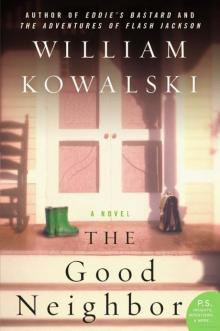 The Good Neighbor
The Good Neighbor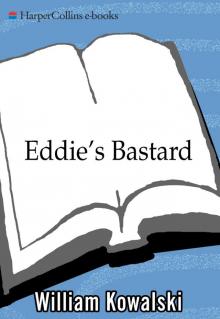 Eddie's Bastard
Eddie's Bastard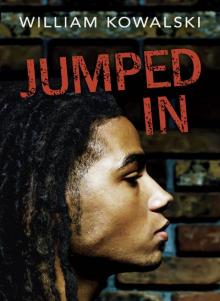 Jumped In
Jumped In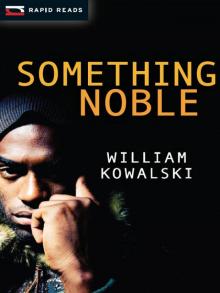 Something Noble
Something Noble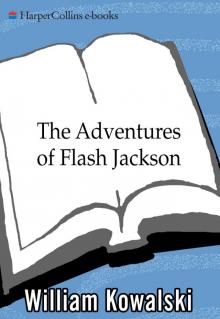 The Adventures of Flash Jackson
The Adventures of Flash Jackson Just Gone
Just Gone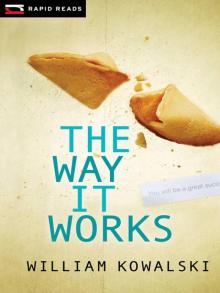 The Way It Works
The Way It Works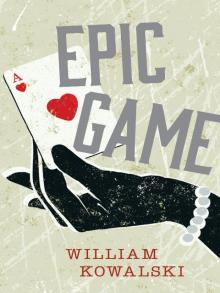 Epic Game
Epic Game